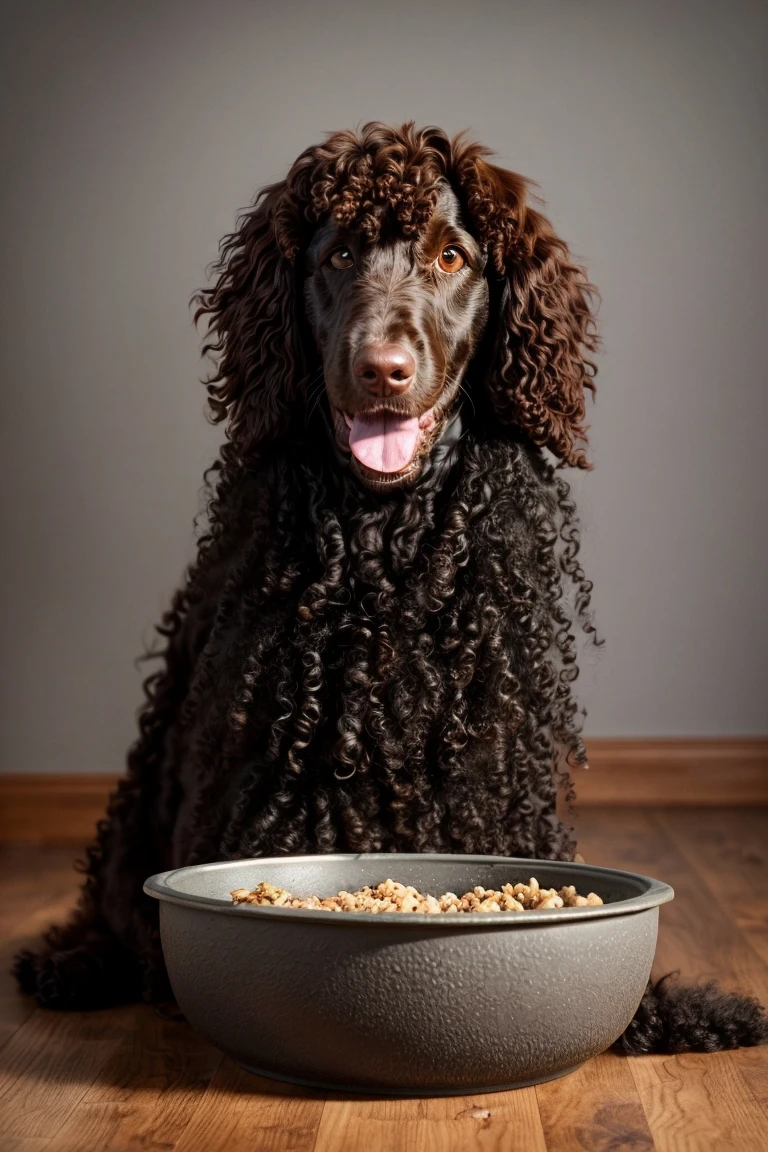The Best Diets for Curly-Coated Retrievers

The Curly-Coated Retriever is an energetic, athletic breed that benefits from high quality nutrition tailored to support their active lifestyle. Crafting the optimal diet will keep your Curly healthy and fueled for fun. Let's explore the ideal nutritional components to look for and some diet tips.
Overview of Curly-Coated Retriever Nutrition Needs
Originally bred as water retrievers, Curly-Coated Retrievers maintain a high activity level requiring robust nutrition. Key dietary needs include:
- Quality protein - Provides amino acids for building and repairing muscle. Look for meat or fish as first ingredients.
- Healthy fats - Concentrated energy source for an active breed. Omega fatty acids support coat and brain.
- Complex carbohydrates - For sustained energy. Whole grains like brown rice are best.
- Vitamins & minerals - Support bone health, immune function, brain development, and disease prevention.
- Glucosamine & chondroitin - Protect joint health in athletic, working dogs.
- Digestive enzymes & probiotics - Aid digestion of high protein diet. Prevent gas and diarrhea.
Diets formulated specifically for active sporting breeds best meet the unique nutritional demands of the Curly-Coated Retriever.
Puppy Diet
Providing the right nutrition in a puppy's first year sets the stage for lifelong health. Look for these components in a puppy formula:
- 22% protein minimum - Supports rapid muscle growth and development.
- 8-10% fat - Fuels growth and energy needs.
- Calcium/phosphorus balance - For proper bone formation. Too much leads to developmental issues.
- DHA & ARA - Key fatty acids for brain, eye, and cognitive growth.
- Multiple small meals - Prevents gorging while supporting digestion and growth.
- Highly digestible - Easily absorbed protein and carbs prevent gastric issues. Consider wet food.
Follow your veterinarian's recommendations for the ideal feeding amounts and schedule as your Curly puppy grows.
Adult Diet
By 12-18 months old, Curlies can transition to an adult formula. Adjustments include:
- At least 18% protein - Supports lean muscle mass and sustained energy.
- 10-12% fat - Provides concentrated energy. Too much fat leads to obesity.
- Joint supplements - Chondroitin, glucosamine, and omega fatty acids protect joint health.
- 2 meals per day - Most adult Curlies maintain a stable energy level on two daily feedings.
- Limited calories - Prevent obesity by not overfeeding. Adjust amount based on activity level and weight.
An adult Curly in good condition should have a visible waistline and easily feelable ribs. Adjust food as needed to maintain ideal body condition.
Ingredients to Look For
When comparing dog food options, seek out these beneficial ingredients:
Quality Protein Sources: Chicken, turkey, lamb, bison, eggs, salmon, sardines
Whole Grains: Brown rice, barley, oatmeal, quinoa
**Fruits & Vegetables: **Broccoli, spinach, peas, apples, blueberries
Healthy Fats: Chicken fat, fish oil, flaxseed, olive oil
Joint Supports: Glucosamine, chondroitin, MSM, green-lipped mussel
Probiotics & Fiber: Chicory root, pumpkin, lactobacillus cultures
Look for simple formulas with real food ingredients suited for athletic dogs. Avoid artificial preservatives, colors, and flavors.
Ingredients to Avoid
Steer clear of these undesirable ingredients for Curly-Coated Retrievers:
- Artificial preservatives - BHA, BHT - potentially toxic
- Fillers - Corn, wheat, soy - simply cheap filler
- By-products/meat meals - Beaks, feathers, unknown origins
- Sugars & salt - Risk of obesity, diabetes, and heart disease
- Artificial colors & flavors - Red 40, Yellow 5 - no nutritional value
- Hormones & antibiotics - Health concerns
Carefully read all labels and avoid ambiguous ingredients like "poultry meal" where the source isn't specified. Seek transparent, high quality ingredients.
Homemade Diet Option
Some owners opt to prepare homemade meals for their Curlies. Benefits include:
- Total control over ingredients
- Ability to personalize recipes
- Appeal of whole food ingredients
However, homemade diets do require:
- Balancing all nutrients in proper ratios
- Additional supplements likely needed
- Measuring and preparing food regularly
- Ensuring adequate calcium and phosphorus
Work closely with your veterinarian and a canine nutritionist if pursuing homemade meals to ensure you provide complete and balanced daily nutrition.
Sample Feeding Schedule
Here is a sample feeding schedule for an adult Curly-Coated Retriever:
**7 AM - **2 cups high quality kibble
**5 PM - **2 cups kibble mixed with 2 tbsp canned food
Add a fish oil capsule and glucosamine supplement with dinner. Adjust amounts as needed to maintain ideal body condition. Active dogs or those who self-regulate may require smaller meals fed more frequently.
Feeding Tips
Follow these tips for the healthiest diet regimen for your Curly:
- Select an age-appropriate premium dog food formula
- Feed scheduled meals instead of free feeding
- Monitor weight frequently and adjust amounts accordingly
- Incorporate tasty mix-ins like canned food or broths
- Avoid overfeeding - obesity is hard on joint health
- Provide plenty of fresh water at all times
- Limit unhealthy snacks and table scraps
- Store kibble properly to retain nutrition
- Be alert to signs of food allergies or sensitivities
Proper canine nutrition tailored specifically for active sporting breeds provides the fuel and health benefits your Curly-Coated Retriever needs to stay energized and ready for fun. Consult your veterinarian for personalized diet advice.
The Bottom Line
Like all dogs, Curly-Coated Retrievers thrive when fed a diet formulated to provide complete and balanced nutrition matched to the breed's high activity level. Feed premium quality proteins, fats, and carbohydrates in the optimal ratios. Cater both puppy and adult diets to the unique needs of the breed's life stages. Monitor weight closely and adjust food amounts accordingly. With robust nutrition powering your Curly, they'll have the stamina and health for endless adventures together!